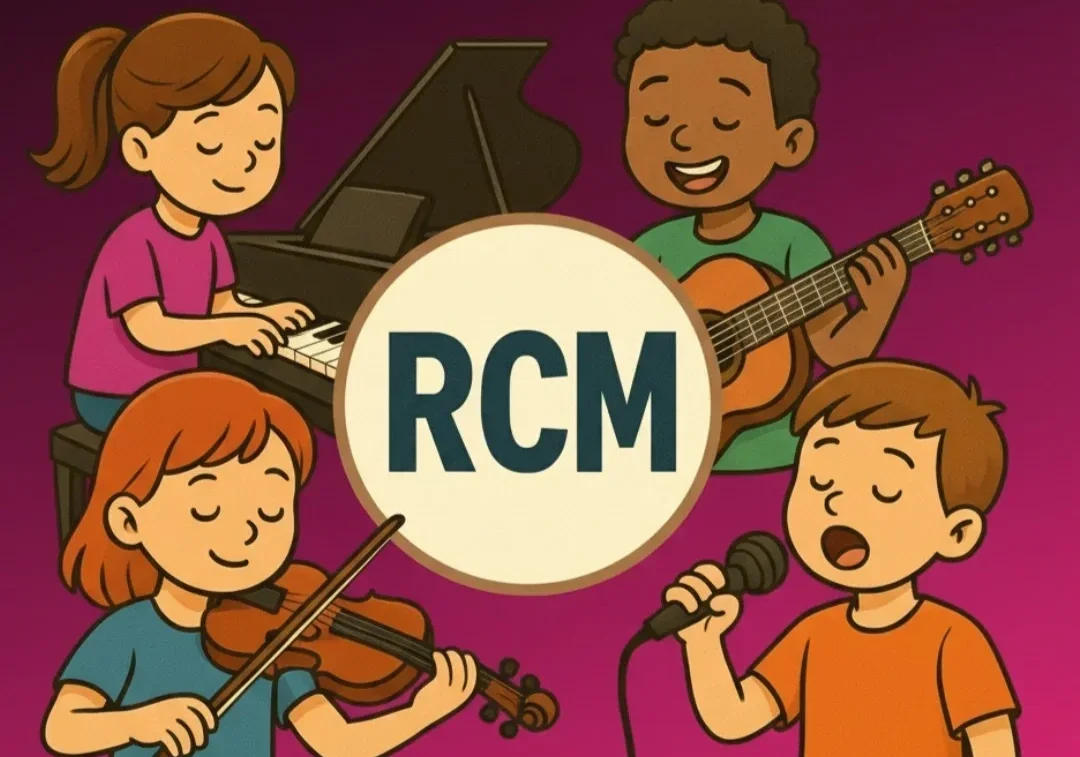RCM for Piano, Guitar, Violin, and Voice Lessons
Why We're Digging Deeper: The RCM Difference for piano, guitar, violin and voice instruments
Last week, we gave an overview of the Royal Conservatory of Music (RCM), highlighting why this internationally renowned curriculum is the ultimate roadmap for achieving musical mastery. For students and parents in Surrey, Langley, White Rock, and Delta, BC, the RCM provides structure, accountability, and recognized academic credit. But what does the RCM actually look like when applied to a specific instrument?
The journey of a pianist is very different from that of a vocalist! At NUVO Music School, we know that each instrument presents its own unique set of challenges and triumphs. In this post, we’re going to narrow our focus and explore the specific advantages and requirements the RCM brings to four distinct worlds of music, detailing how it transforms casual practice into purposeful progress.
RCM Piano: The Foundation of Excellence
The piano is often the entry point to music, but its vast repertoire and technical demands require discipline. The RCM system for piano ensures no vital skill is left behind:
Systematic Technique: RCM Piano provides a rigorous system of scales, arpeggios, and exercises specific to each level. This technical foundation builds the finger strength, independence, and coordination essential for tackling complex pieces. It’s the key difference between struggling through a piece and performing it with ease.
Diverse Repertoire: Students learn to interpret music from every major era—Baroque, Classical, Romantic, and Contemporary. This exposure develops musical artistry and ensures the student becomes a thoughtful interpreter of various styles, not just a performer.
Integrated Academics: RCM mandates co-requisite Theory and History exams. This deep academic understanding of harmony, composition, and historical context directly enhances performance, allowing pianists to play with greater insight.
RCM Guitar: Bringing Structure to a Versatile Instrument
The guitar is one of the most popular instruments, yet many students start with casual methods, often developing bad habits and lacking comprehensive musical literacy. The RCM Guitar program changes that, bringing discipline to this versatile instrument.
Beyond the Chord Chart: While most self-taught guitarists know basic chords, the RCM syllabus dives deep into fingerstyle technique, musical phrasing, and tonal quality. This structured approach builds the kind of precision and expressiveness required for true musicality.
Musical Literacy: RCM exams require sight-reading and ear training, making students fluent in the universal language of music. This skill, often missed in casual instruction, is critical for composition, collaboration, and learning complex scores.
Broad Styles: The RCM Guitar curriculum explores a wide repertoire, ensuring students are comfortable with everything from Renaissance dances and Baroque pieces to contemporary concert works, expanding their musical comfort zone far beyond standard pop songs.
RCM Violin: The Roadmap for Precision and Expression
The violin is famous for its beautiful sound, but it is one of the most challenging instruments to master due to the demands on intonation (pitch accuracy) and bow control. The RCM Violin curriculum is crucial for guiding this difficult, rewarding journey.
Technique is King: The RCM systematically introduces exercises and technical requirements that build strong, precise left-hand finger patterns and refined, nuanced bowing techniques. This rigorous training prevents the common frustration that arises from inconsistent pitch and poor tone quality.
Progressive Repertoire: Students advance through curated repertoire that progressively challenges their skills, from simple folk melodies to complex concertos. The RCM structure ensures that the pieces they learn perfectly align with and reinforce the technical skills they are mastering.
Performance Confidence: Preparing for RCM examinations is an excellent way to develop discipline, focus, and performance confidence—skills that benefit students far beyond the music studio.
RCM Voice: Developing a Healthy and Powerful Instrument
For young singers, having the right training is paramount, as improper technique can lead to long-term strain. The RCM Voice program provides the safest, most structured, and most comprehensive path for vocal development.
Healthy Technique First: The program emphasizes foundational skills like breathing control, posture, and resonance. This approach ensures students develop a powerful voice without straining their vocal chords—a critical factor for young, developing instruments.
Diction and Repertoire: RCM Voice students explore a diverse range of repertoire, often requiring them to sing in multiple languages. This training instils excellent diction, articulation, and expressive interpretation.
Aural and Sight-Singing Skills: The ability to hear and reproduce music accurately (aural skills) and to sing a piece of music the first time they see it (sight-singing) are core to the RCM program, providing singers with invaluable literacy for choir, theatre, or future auditions.
Ready to Start Your RCM Journey?
Whether your child is interested in pressing the keys, strumming the strings, bowing a melody, or finding their voice, NUVO Music School is your local RCM preparation expert.
Our highly trained piano, guitar, voice and violin instructors have deep knowledge of the RCM syllabus for all instruments and can provide personalized, integrated lesson plans right here in Surrey, Langley, White Rock, and Delta, BC.
Contact NUVO Music School today at +1 604-613-3340 to discuss your goals and get started.

